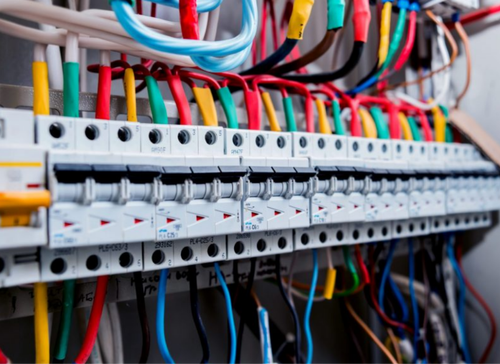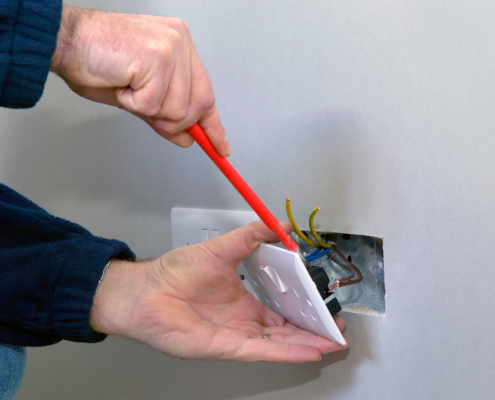Comprehensive Solutions from BRE Services for All Your Demands
Comprehensive Solutions from BRE Services for All Your Demands
Blog Article
Demystifying Electrical Installation: Comprehending Codes and Laws for a Lawful and Safe Arrangement
In the world of electrical setup, adherence to codes and laws is extremely important to ensure both legality and safety and security. The trip to debunking electric installation goes past mere familiarity with policies; it requires an extensive grasp of just how to implement risk-free electrical techniques efficiently.
Significance of Electric Codes
The adherence to electric codes is vital in ensuring the security and reliability of electric installations. Electric codes work as a set of standards and guidelines that determine the appropriate style, installation, and upkeep of electrical systems. These codes are developed to lessen the danger of electric threats, fires, and other safety and security worries that may arise from damaged electric work.

Additionally, electrical codes are regularly updated to incorporate new technologies, ideal methods, and precaution. Staying upgraded with these codes is essential for experts in the electrical industry to make sure that their job fulfills the most up to date safety standards. Eventually, the importance of electric codes hinges on producing a safe and secure and reliable electric framework that benefits both individuals and communities.
Secret Rules for Safety
A number of essential laws govern the safety and security standards in electric installments. One key policy is the National Electrical Code (NEC), which supplies guidelines for safe electric style, setup, and examination to shield individuals and residential property from electrical threats. The NEC covers aspects such as wiring approaches, grounding, overcurrent defense, and tools installation to make certain a secure electrical system.
One more essential policy is the Occupational Safety and Health Administration (OSHA) requirements, which concentrate on the safety of workers associated with electric installments (BRE Electrical Solutions). OSHA policies include demands for proper training, safety treatments, and personal protective equipment to stop work environment mishaps and injuries
Additionally, the International Electrotechnical Payment (IEC) requirements aim to balance electric installment policies on a global range. These requirements address issues like electrical devices safety and security, electromagnetic compatibility, and power effectiveness to promote uniformity and security in electrical installments worldwide.
Compliance with these essential policies is crucial to ensure the safety and legality of electrical setups, securing both individuals and building from the dangers connected with electrical energy.
Comprehending National Electric Code
Key regulations such as the National Electric Code (NEC) offer vital guidelines for secure electrical layout, installation, and evaluation to make sure the security of individuals and building from electric risks. The NEC, likewise understood as NFPA 70, is a thorough set of standards for electrical installments that are upgraded every three years. It is established by the National Fire Defense Association (NFPA) and is extensively adopted across the USA.
The NEC covers different facets of electrical work, consisting of wiring methods, grounding, overcurrent defense, and tools installation. It intends to safeguard people and residential or commercial property by dealing with prospective risks connected with electrical systems. Conformity with the NEC is typically applied by neighborhood authorities having jurisdiction (AHJs), such as developing code officials and examiners.
Comprehending the NEC is critical for electrical contractors, designers, and examiners to make certain that installations meet the necessary security requirements. By adhering to the NEC standards, specialists can assist avoid electrical crashes and make certain the reliability of electrical systems in property, industrial, and industrial setups.

Compliance With Neighborhood Building Ordinance
Understanding and adhering to local structure codes is important for making certain the safety and security and conformity of electrical installments within a certain jurisdiction. These codes describe certain needs for electric installations, such as the type of BRE Electrical wiring to be used, placement of outlets, grounding methods, and tons capabilities.
When it comes to electrical setups, failure to conform with neighborhood structure codes can result in significant consequences. Non-compliant setups may posture safety and security threats, boost the danger of electrical fires, and lead to pricey fines or lawful problems.
Making Certain Safe Electric Practices
Exercising rigorous adherence to developed security procedures is vital in the area of electric setups to alleviate possible dangers and make sure the wellness of individuals and buildings. Security in electrical job includes various aspects, beginning with the appropriate training of personnel entailed in setup, maintenance, and fixing. By prioritizing safe methods, electrical installments can work efficiently while decreasing the probability of mishaps or damage.
Verdict
Finally, adherence to electric codes and laws is vital for making sure the security and validity of electrical installations. Recognizing the National Electric Code and compliance with neighborhood building ordinance are important for a secure configuration. By adhering to these standards and practicing secure electrical techniques, individuals can prevent prospective hazards and make certain the appropriate performance of their electrical systems.
Report this page